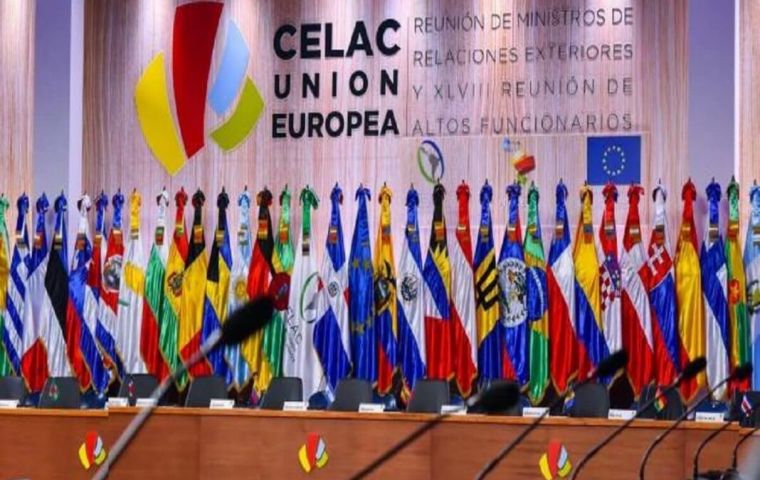
BRUSSELS, July 16 (NNN-MERCOPRESS) — The summit between the Community of Latin American and Caribbean States (CELAC) and the European Union (EU) to be held in Brussels on Monday and Tuesday is surrounded by an aura of optimism, it was reported.
The meeting will mark the resumption of relationships at the highest level after eight years.
“The most important thing about this summit is the summit itself. The first message we have to underline is that we need to recover this space for dialogue after eight years in which we were unable to connect with the EU,” said the Argentine Undersecretary for Latin American and Caribbean Affairs, Gustavo Martínez Pandiani.
“As Argentina’s national coordinator, I’m taking part in intense negotiations related to various important issues of the biregional dialogue between Latin America & the Caribbean and Europe,” he posted in English on social media.
The two blocs represent 61 countries, one-third of the members of the United Nations, 21% of the world’s gross domestic product (GDP), and more than one billion people (almost 14% of the world’s population). Of the 33 Latin American and Caribbean delegations expected to attend the summit, 26 of them will be represented by heads of state or government.
It will be the ninth summit between the EU and Latin America and the Caribbean, and the third since CELAC came into existence. The leaders of both blocs had not met since June 2015. After that last meeting, the pandemic or the temporary departure of Brazil from the Latin American grouping complicated the relaunching of those encounters.
To ensure that these summits are held every two years, the EU proposed a “coordination mechanism”, which consists of a “light structure that will be adapted to the format that CELAC wants” and will be based on periodic meetings of senior officials and foreign ministers, with the idea of covering a roadmap of joint work in 2023 and 2024 until the next summit, which they hope to hold in 2025 with Colombia as pro tempore president.
Both blocs are negotiating against the clock the declaration they hope to approve at the summit, and in which the EU wants to include a condemnation of the Russian war of aggression in Ukraine, which is backed by one of the regions of the world with which it considers it has one of the most like-minded.
According to a senior EU official, “the gaps are closing” while issues such as climate change mitigation financing are still being negotiated. On this topic, the EU is willing to evaluate Colombian President Gustavo Petro’s proposal to restructure the global financial system to adopt the exchange of foreign debt for climate action.
On the other hand, CELAC wants to include in the text a reference to reparations and the condemnation of slavery.
The EU is “interested in moving forward” on the trade agreement with Mercosur, making it clear that the European proposal for an additional instrument on climate and the prevention of deforestation does not include sanctions.
On this point, Martínez Pandiani said he did not expect any major advances but did not rule out the possibility that the leaders of the EU and Mercosur could hold a meeting on the sides of the summit.
On the other hand, during the summit, the EU expects to sign several specific agreements: two political memorandums of understanding with El Salvador and Honduras, two energy agreements with Uruguay and Argentina, and one on raw materials with Chile, in addition to a political agreement with Colombia which they hope to promote during Petro’s possible visit to Brussels in October. — NNN-MERCOPRESS





